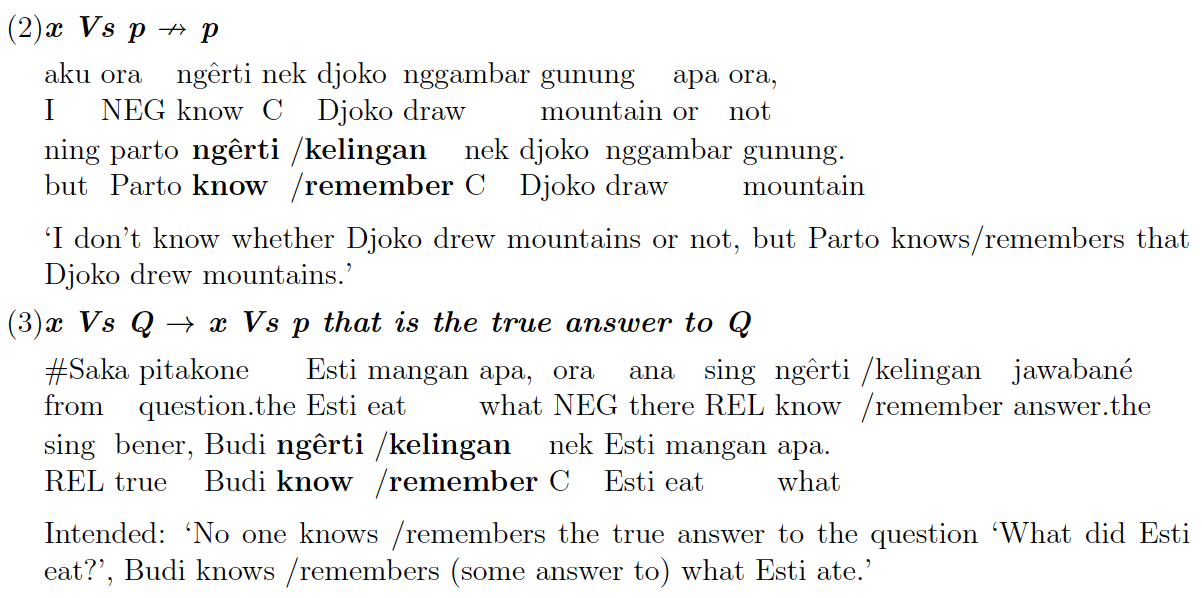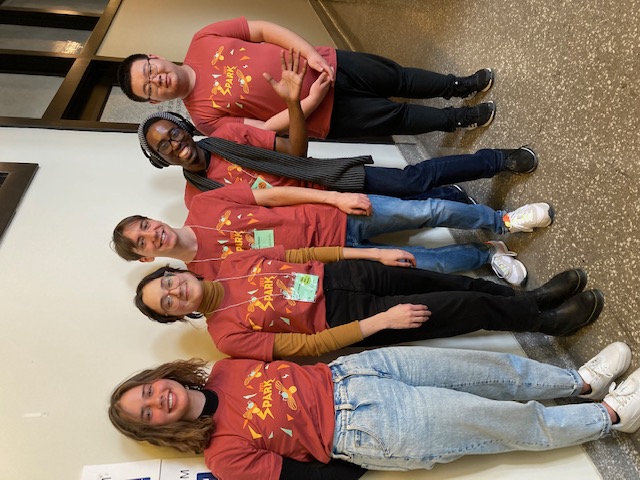Issue of Monday, March 20th, 2023
Exp/Comp (3/24) [virtual]: Curtis Chen and Martin Hackl (MIT)
When: Friday, March 24 @ 2pm.
Where: Online. Zoom link TBA.
Title of Talk: Towards a computational model of reference resolution and MaxP! effects in “Haddock descriptions”
Syntax Square 3/21 - Juan Cancel (MIT)
Speaker: Juan Cancel (MIT)
Title: The suffix -γi in Central Alaskan Yupik: Antipassive and Applicative Marker, or just an Applicative Marker
Time: Tuesday, March 21st, 1pm - 2pm
Abstract: For my undergrad thesis, I looked at -γi, a valency-changing suffix in Central Alaskan Yupik (CAY) with adversative/malefactive qualities. When the suffix appears in ergative-aligned transitive verbs, -γi is the most productive marker of the antipassive, but when it appears in accusative-aligned transitive verbs, -γi marks the applicative, adding a new argument with absolutive case. In addition to this, when it appears in intransitive verbs, -γi still marks the applicative, but the newly added argument appears with ergative case. Although most of the literature has subsumed -γi as functioning both as an antipassive and an applicative marker, I argued that -γi is just an applicative marker and that its antipassive use is the result of zero -derivation, another valency-changing operation in CAY.
Speaker: Juan Cancel (MIT)
Title: The suffix -γi in Central Alaskan Yupik: Antipassive and Applicative Marker, or just an Applicative Marker
Time: Tuesday, March 21st, 1pm - 2pm
Abstract: For my undergrad thesis, I looked at -γi, a valency-changing suffix in Central Alaskan Yupik (CAY) with adversative/malefactive qualities. When the suffix appears in ergative-aligned transitive verbs, -γi is the most productive marker of the antipassive, but when it appears in accusative-aligned transitive verbs, -γi marks the applicative, adding a new argument with absolutive case. In addition to this, when it appears in intransitive verbs, -γi still marks the applicative, but the newly added argument appears with ergative case. Although most of the literature has subsumed -γi as functioning both as an antipassive and an applicative marker, I argued that -γi is just an applicative marker and that its antipassive use is the result of zero -derivation, another valency-changing operation in CAY.
LF Reading Group 3/22 - Tanya Bondarenko (Harvard Universiy)
Speaker: Tanya Bondarenko (Harvard Universiy)
Title: Veridicality mismatches in Javanese
Time: Wednesday, March 22nd, 1pm - 2pm
Abstract: In this talk I discuss a violation of the Spector & Egré’s generalization about the correlation between veridicality in declarative and interrogative embeddings, (1).
(1)Spector & Egre (2015)’s Generalization:
A responsive predicate is veridical with respect to its interrogative complement (like know + question = knowing the true answer to the question) if and only if it is veridical with respect to its declarative complements as well (know + declarative entails —in fact presupposes— that the declarative is true). (Spector & Egre 2015: 1732)
The counterexample to the generalization comes from Javanese: the verbs `know’ (ngêrti) and `remember’ (kelingan) in this language are veridical with respect to question embedding, (3), but, surprisingly, are not veridical with respect to the declarative embedding, (2).
I propose that this pattern emerges from a combination of two factors: (i) embedded clauses in Javanese are always adjuncts, and compose with verbs as modi ers that specify the propositional content of the verbal eventuality (see Bogal-Allbritten 2016, Elliott 2017, Bochnak & Hanink 2021, Bondarenko 2022, a.o.), which leads to the lack of veridicality with declarative embedding; (ii) propositional content associated with ngêrti `know’ and kelingan `remember’ is required to be a single proposition, which in cases of interrogative embedding triggers insertion of an answerhood operator (Dayal 1996) that gives rise to veridicality. I furthermore show that while ngêrti `know’ is non-veridical with declarative complements, it is different from `think/believe’: it comes with a presupposition that the embedded proposition is not known to be false. I suggest to encode this restriction as a definedness condition on the propositional content associated with the mental state that ngêrti denotes.
References
Bogal-Allbritten, Elizabeth. 2016. Building meaning in Navajo. University of Massachusetts Amherst dissertation.
Bochnak, Ryan & Emily Hanink. 2021. Clausal embedding in Washo: Complementation vs. modi cation. Natural Language & Linguistic Theory. 1-44.
Bondarenko, Tatiana. 2022. Anatomy of An Attitude. MIT dissertation.
Dayal, Veneeta. 1996. Locality in WH-quanti cation: Questions and relative clauses in Hindi. Dordrecht: Kluwer Academic Publishers.
Elliott, Patrick. 2017. Elements of clausal embedding. UCL (University College London) dissertation.
Spector, B. and Egr e, P., 2015. A uniform semantics for embedded interrogatives: An answer, not necessarily the answer. Synthese, 192, pp.1729-1784.
Speaker: Tanya Bondarenko (Harvard Universiy)
Title: Veridicality mismatches in Javanese
Time: Wednesday, March 22nd, 1pm - 2pm
Abstract: In this talk I discuss a violation of the Spector & Egré’s generalization about the correlation between veridicality in declarative and interrogative embeddings, (1).
(1)Spector & Egre (2015)’s Generalization:
A responsive predicate is veridical with respect to its interrogative complement (like know + question = knowing the true answer to the question) if and only if it is veridical with respect to its declarative complements as well (know + declarative entails —in fact presupposes— that the declarative is true). (Spector & Egre 2015: 1732)
The counterexample to the generalization comes from Javanese: the verbs `know’ (ngêrti) and `remember’ (kelingan) in this language are veridical with respect to question embedding, (3), but, surprisingly, are not veridical with respect to the declarative embedding, (2).
I propose that this pattern emerges from a combination of two factors: (i) embedded clauses in Javanese are always adjuncts, and compose with verbs as modi ers that specify the propositional content of the verbal eventuality (see Bogal-Allbritten 2016, Elliott 2017, Bochnak & Hanink 2021, Bondarenko 2022, a.o.), which leads to the lack of veridicality with declarative embedding; (ii) propositional content associated with ngêrti `know’ and kelingan `remember’ is required to be a single proposition, which in cases of interrogative embedding triggers insertion of an answerhood operator (Dayal 1996) that gives rise to veridicality. I furthermore show that while ngêrti `know’ is non-veridical with declarative complements, it is different from `think/believe’: it comes with a presupposition that the embedded proposition is not known to be false. I suggest to encode this restriction as a definedness condition on the propositional content associated with the mental state that ngêrti denotes.
References
Bogal-Allbritten, Elizabeth. 2016. Building meaning in Navajo. University of Massachusetts Amherst dissertation.
Bochnak, Ryan & Emily Hanink. 2021. Clausal embedding in Washo: Complementation vs. modi cation. Natural Language & Linguistic Theory. 1-44.
Bondarenko, Tatiana. 2022. Anatomy of An Attitude. MIT dissertation.
Dayal, Veneeta. 1996. Locality in WH-quanti cation: Questions and relative clauses in Hindi. Dordrecht: Kluwer Academic Publishers.
Elliott, Patrick. 2017. Elements of clausal embedding. UCL (University College London) dissertation.
Spector, B. and Egr e, P., 2015. A uniform semantics for embedded interrogatives: An answer, not necessarily the answer. Synthese, 192, pp.1729-1784.
MIT Linguists @ MIT Spring Spark
Students in 24.S95 Linguistics in K-12 Education—Aspen Abner, Cora Lesure, Lorenzo Pinton, Christopher Legerme, and Vincent Zu—are all smiles after teaching 7th and 8th graders at MIT’s Spring Spark on Saturday, March 18. Not surprisingly, the course that they designed and taught, Linguistics: The Science of Language, sparked a lot of interest!
Students in 24.S95 Linguistics in K-12 Education—Aspen Abner, Cora Lesure, Lorenzo Pinton, Christopher Legerme, and Vincent Zu—are all smiles after teaching 7th and 8th graders at MIT’s Spring Spark on Saturday, March 18. Not surprisingly, the course that they designed and taught, Linguistics: The Science of Language, sparked a lot of interest!
LingLunch 3/23 - Ksenia Ershova (MIT)
Speaker: Ksenia Ershova (MIT)
Title: Licensed to license: Deficient probes in West Circassian nominalizations
Time: Thursday, March 23rd, 12:30pm - 2pm
Abstract: This talk argues for a context-dependent, counter-cyclic view of φ-probe feature
deficiency: verbal probes must be licensed by the highest head in the extended projection (C^0) in order to agree with and license nominal arguments. This is supported by verbal nominalizations in West Circassian (WC), which, despite being as large as TP and including the full range of verbal φ-probes, cannot expone verbal φ-agreement, assign case or license arguments. The proposal may be extended to other instances of probes being licensed by a higher projection, e.g. ERG-assigning v^0 in Hindi (Legate 2008) or genitive of negation in Russian (Bailyn 2004).
Speaker: Ksenia Ershova (MIT)
Title: Licensed to license: Deficient probes in West Circassian nominalizations
Time: Thursday, March 23rd, 12:30pm - 2pm
Abstract: This talk argues for a context-dependent, counter-cyclic view of φ-probe feature
deficiency: verbal probes must be licensed by the highest head in the extended projection (C^0) in order to agree with and license nominal arguments. This is supported by verbal nominalizations in West Circassian (WC), which, despite being as large as TP and including the full range of verbal φ-probes, cannot expone verbal φ-agreement, assign case or license arguments. The proposal may be extended to other instances of probes being licensed by a higher projection, e.g. ERG-assigning v^0 in Hindi (Legate 2008) or genitive of negation in Russian (Bailyn 2004).
Colloquium 3/24 - Vera Hohaus (Manchester)
Speaker: Vera Hohaus (MIT)
Title: Linguistic Illusions Revisited: The Role of Maximal Informativity
Time: Friday, March 24th, 3:30pm - 5pm
Abstract: Building on joint work with Nadine Bade (Universität Potsdam) and Ryan Walter Smith (The University of Manchester), this talk revisits two prominent cases of linguistic illusions that involve comparison, so-called depth-charge sentences like (1) and under-over illusions like (2).
(1) No head injury is too insignificant to be ignored.
(2) The importance of the rainforest cannot be underestimated.
We demonstrate that both the pedantic and the intended interpretation of these sentences can be derived compositionally. The alleged illusion arises from the interaction of maximal informativity with the monotonicity of the degree predicate underlying the comparison.
Speaker: Vera Hohaus (MIT)
Title: Linguistic Illusions Revisited: The Role of Maximal Informativity
Time: Friday, March 24th, 3:30pm - 5pm
Abstract: Building on joint work with Nadine Bade (Universität Potsdam) and Ryan Walter Smith (The University of Manchester), this talk revisits two prominent cases of linguistic illusions that involve comparison, so-called depth-charge sentences like (1) and under-over illusions like (2).
(1) No head injury is too insignificant to be ignored.
(2) The importance of the rainforest cannot be underestimated.
We demonstrate that both the pedantic and the intended interpretation of these sentences can be derived compositionally. The alleged illusion arises from the interaction of maximal informativity with the monotonicity of the degree predicate underlying the comparison.
MIT @ PLC47
The 47th Penn Linguistics Conference took place at the University of Pennsylvania on over the weekend (March 18-19). The program included presentations by the following members of the MIT community:
- Adèle Hénot-Mortier (4th year): Superiority effects and the French Plural Pronoun Construction
- Katya Morgunova and Anastasia Tsilia (2nd year): Why would you D that? On the D-layer in Greek clausal subjects
The 47th Penn Linguistics Conference took place at the University of Pennsylvania on over the weekend (March 18-19). The program included presentations by the following members of the MIT community:
- Adèle Hénot-Mortier (4th year): Superiority effects and the French Plural Pronoun Construction
- Katya Morgunova and Anastasia Tsilia (2nd year): Why would you D that? On the D-layer in Greek clausal subjects

